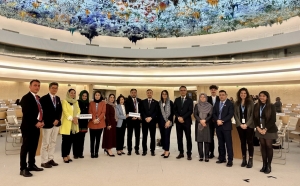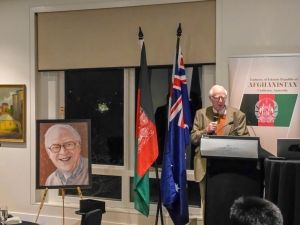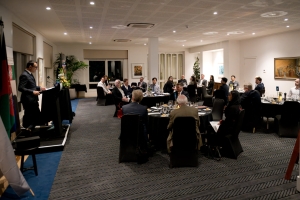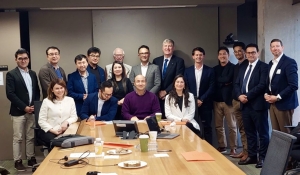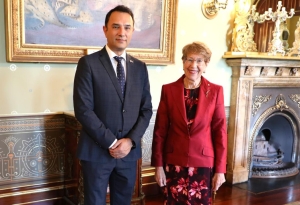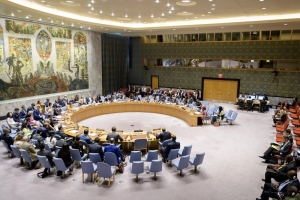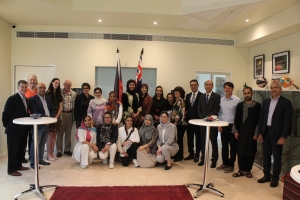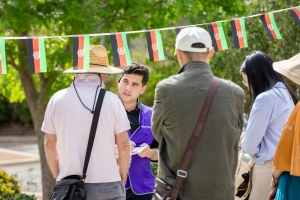Afghanistan’s Human Rights Review: A Critical Juncture
Geneva, May 3, 2024
In a significant session of the Human Rights Council, Afghanistan's fourth cycle report for the Universal Periodic Review (UPR) was adopted. This adoption marks a pivotal moment for the country, offering a platform to address and evaluate the pressing human rights challenges it faces.
Understanding the UPR Mechanism
The UPR, established by UN General Assembly resolution 60/251 and HRC resolutions 5/1 and 16/21, is a unique process that involves the periodic review of the human rights records of all UN Member States. This mechanism allows states to outline the steps they have taken to improve human rights conditions and to address ongoing challenges.
The Review Session
On April 29, 2024, Afghanistan’s delegation, led by Dr. Nasir Ahmad Andisha, Ambassador and Permanent Representative of Afghanistan to the United Nations Office at Geneva (UNOG), presented the national report. The report starkly highlighted the severe breakdown of fundamental human rights in the country, encompassing civil, political, economic, social, and cultural rights. Ambassador Wahidullah Waissi presented the economic part of the UPR, shedding light on the economic hardships and their impact on the human rights of Afghan citizens.
Focusing on Key Issues
The review placed a significant emphasis on documented human rights abuses, particularly those affecting women, girls, and ethnic and religious minorities. Reports from UN agencies and various international organizations underscored the severe human rights challenges in Afghanistan, exacerbated by Taliban policies. Over 200 edicts and directives have severely restricted basic freedoms, with the most stringent measures targeting women and girls, effectively erasing them from public life and violating their fundamental rights.
Outcomes and Recommendations
On May 3, 2024, the Troika members, including the Netherlands, India, and Burundi, presented the outcome of the review. Afghanistan received 243 recommendations from 70 states. The Permanent Mission of Afghanistan, in consultation with relevant stakeholders, will meticulously examine these recommendations and submit a written report before the commencement of the 57th Human Rights Council session.
Acknowledgements and Future Steps
The Permanent Mission of Afghanistan to UNOG expressed gratitude to the UN Member and Observer States for their constructive engagement and to the Bureau, the UPR Secretariat, and the Troika members for their dedicated efforts in ensuring the success of Afghanistan's review. As Afghanistan navigates this critical juncture, the global community's role in advocating for and ensuring the protection of human rights within the country is more vital than ever. The outcomes of this review are expected to play a crucial role in shaping international responses and strategies to address the ongoing crisis in Afghanistan.
Conclusion
The adoption of Afghanistan's UPR report during the 46th session of the Human Rights Council marks a significant step in addressing the severe human rights issues in the country. With the global community’s support and constructive engagement, there is hope for meaningful progress in protecting and promoting human rights in Afghanistan.
On the evening of June 6, 2024, The Embassy of the Islamic Republic of Afghanistan had the great honor of celebrating the lifetime achievements of Emeritus Professor William Maley, AM, during the reception for the New Generation of Afghan Scholars and on the occasion of 75th anniversary of establishment of the international department at the Coral Bell School of the Australian National University.
Professor Maley’s profound influence on the field of international relations and his extensive work on Afghanistan have made him one of Australia’s most respected scholars. His contributions as an author, guiding thinker, and mentor have significantly shaped our understanding of Afghanistan and its place in the global order. HE Ambassador Wahidullah Waissi introduced him and emphasized how his influence is so profound that words often fall short: "He is Australia's acclaimed scholarly figure, a successful author, a guiding thinker, and a mentor to many of us here discussing the future of Afghanistan."
The highlight of the evening was the unveiling of a portrait of Professor Maley, painted by the Artlords Afghanistan, a group known for their powerful and evocative artworks. Ambassador Waissi, through the esteemed musician and diplomat Fred Smith, had the honor of unveiling this beautiful portrait. This artwork is a testament to Professor Maley's enduring legacy and his unwavering commitment to Afghanistan. In addition to the portrait, Professor Maley was presented with a trophy, symbolizing his lifetime of dedication and achievements.
Professor Maley is the author of numerous books that have greatly contributed to the academic and policy discourse on Afghanistan. His notable works include "Rescuing Afghanistan," "The Afghanistan Wars," "Transition in Afghanistan: Hope, Despair and the Limits of Statebuilding," and his latest co-authored book "The Decline and Fall of Republican Afghanistan".His extensive body of work continues to inspire scholars, policymakers, and students worldwide.
This celebration not only recognized his individual achievements but also highlighted the importance of his contributions to the ongoing dialogue about Afghanistan's future. It was a fitting tribute to a man whose work has left an indelible mark on the field of international relations.
To access photos of the event, click here.
Opening Remarks of H. E. Wahidullah Waissi
Ambassador of the Islamic Republic of Afghanistan in Canberra, Australia
On the Reception for the New Generation of Scholars
The Commonwealth Club
6 June 2024
Ladies and Gentlemen,
Good evening and welcome.
I begin by acknowledging the Ngunnawal and Ngambri peoples, the traditional custodians of the Canberra area, and pay my respects to the elders past and present of all Australia's Indigenous peoples.
It is a privilege to stand before such a distinguished group of individuals.
Tonight, we gather not only to enjoy a meal together but also to celebrate and reflect on the significant achievements and ongoing endeavours in the field of international relations, with a particular focus on Afghanistan.
This dinner marks the successful commencement of an important event, the international workshop on "Afghanistan and International Relations," hosted by the Coral Bell School of the Australian National University.
It is a key part of a series of events throughout 2024, celebrating the 75th anniversary of the establishment of the Department of International Relations at our university.
Our gathering tonight brings together a diverse group of participants: esteemed academics, veterans, diplomats, practitioners, journalists, students, and media professionals.
I would like to acknowledge the presence of our good friend, Commissioner for International Engagement of the Government of the Australian Capital Territory, Mr. Brendan Smyth, and our colleagues from the South and Central Asia Division of the Department of Foreign Affairs and Trade, Dr. Steven Barraclough, and Ms. Joanne Frederiksen.
I also acknowledge the presence of Mr. Parwiz Kawa, Editor-in-Chief of Hasht e Subh Daily Newspaper (8 AM), Ms. Karen Middleton, Political Editor at Guardian Australia, Ms. Anna Henderson, Chief Political Correspondent and Bureau Chief at SBS, the ACT Branch President of the Australian Institute of International Affairs, Mr. Heath McMichael, Director at Griffith University’s Defence Network, Prof. Adam Findley AO, and Lieutenant Colonel in the U.S. Army and scholar from Cornell University, Prof. Paul Lushenko.
I will continue introducing more individuals later, but I would like to acknowledge that among us tonight are 14 PhD scholars from Afghanistan, whose stories of perseverance and resilience inspire us all. Your presence here is a testament to your incredible journey.
I welcome:
- Dr Nematullah BIZHAN
- Dr Farkhondeh AKBARI
- Dr Abbas FARASOO
- Mr Ali ADILI
- Dr Timor SHARAN
- Ms Aryana MOHMOOD
- Mr Jawed NADER
- Dr Niamatullah IBRAHIMI
- Mr Wali YAWARI
- Dr Arif SABA
- Dr Faisal Ahmed HARIS
These scholars have managed to pursue their studies under extraordinarily challenging circumstances, often as refugees or while in exile.
Their presence here in Canberra underscores the critical role of education and scholarly exchange in fostering a more peaceful and stable Afghanistan.
Australia's involvement in Afghanistan over the past two decades has been extensive, encompassing efforts from the Australian Defence Force, the Australian Federal Police, the Department of Foreign Affairs and Trade, and numerous non-governmental organizations.
Australia's commitment to Afghanistan is also evident on humanitarian resettlement program, which has welcomed a growing number of Afghan nationals to its shores.
The Afghan community in Australia is vibrant and culturally rich, contributing significantly to society through art, music, and intellectual engagement. This relationship is further supported by the ongoing provision of essential consular services by the Embassy of Afghanistan.
Our shared objective and responsibility are clear: to resolve the crisis in Afghanistan, primarily for its people, but also for the preservation of international peace and security. Amid the turbulence that unfolded in Afghanistan, countless individuals watched with heavy hearts as the nation's brightest minds sought refuge in distant lands.
These individuals, embodying the essence of our national spirit and potential, departed our borders, yet within them resides a promise of a brighter future for Afghanistan. While the world may perceive their exodus as a 'brain-drain', I urge you to see it from another perspective: today's diaspora, this movement of our most educated and talented, isn't a loss but a preservation.
These individuals, armed with their knowledge, experiences, and resilience borne out of love for their homeland, are the very seeds that, when the time is right, can be replanted to rejuvenate Afghanistan.
We are fortunate to draw on the expertise of a new generation of Afghan scholars based in the United Kingdom, Canada, the United States, and here in Australia.
These scholars are actively contributing to both Afghanistan and international cultural and academic life, and their insights will be invaluable as we seek to produce an academic study of distinction from this workshop.
This will allow us to celebrate our collective commitment to a free and pluralistic Afghanistan.
Ladies and Gentlemen,
Before I conclude, please allow me to acknowledge the presence of three extraordinary individuals who have had a deep impact on the lives, work, and thoughts of both Afghans and Australians through their contributions to Defence, Diplomacy, and Development.
Their presence tonight will make our gathering more meaningful and powerful.
First, I am honoured to introduce Australia's man of many talents—a former commando, veteran, inspirational speaker, advocate, acclaimed author, accomplished actor, and athlete, whose remarkable journey of resilience and achievement inspires us all. Please welcome Mr. Damien Thomlinson, who will reflect on his journey and engagement in Afghanistan later tonight.
Next, we have a celebrated musician, distinguished diplomat, and acclaimed author. His songs, ranging from witty and humorous to profoundly serious, capture the complexities of his experiences in Afghanistan and rest of the world. His deeply emotional and insightful music has earned him critical acclaim and a loyal following. We will also have the opportunity to hear about his experiences tonight. Please welcome Fred Smith.
Lastly, I come to an individual whose influence is so profound that words often fall short. He is one of Australia’s most acclaimed scholars, a successful author, a guiding thinker, and a mentor to many of us here as we discuss the future of Afghanistan. He is the very reason we are gathered tonight. It is my great honour to introduce Emeritus Professor William Maley, AM. While we will not disclose the specifics now, we will acknowledge his remarkable achievements throughout our event.
Thank you, and please enjoy the dinner.
The international workshop on "Afghanistan and International Relations" was a pivotal event held on 6-7 June 2024 at the Coral Bell School of the Australian National University.
The workshop celebrated the 75th anniversary of the Department of International Relations, bringing together a diverse group of esteemed academics, diplomats, practitioners, and students. The workshop was convened and mentored by Emiratus Professor William Maley, AM, FASSIA, FAIIA of the Australian National University and expert of Afghanistan studies.
Over two days, the event featured comprehensive sessions on critical topics, including Afghanistan's legitimacy in the global order, the impact of colonialism and empire, diplomacy, international law, and the transformation of war and terrorism in Afghanistan. The discussions were also around thought-provoking issues such as protecting vulnerable populations, the role of refugees/diaspora communities and forced migration, and the lessons of history for Afghanistan's future.
Prominent contributors such as Paul Lushenko, Adam Findley, Farkhunde Akbar, Nematullah Bizha, Niamatullah Ibrahimi, Parwiz Kawa, Srinjoy Bose, Ahmad Shuja Jamal, Kobra Moradi, Abbas Farasoo, Aref Saba, Ali Adeli, Timor Sharan, Wali Yawari, Homa Frotan, and Aryana Mahmood shared their insights, providing a deep dive into the multifaceted challenges and dynamics of Afghanistan by preseting their research on topics ranging from global gender politics to state-building and democratization. These scholars' stories of perseverance and resilience underscored the critical role of education and scholarly exchange in fostering a more peaceful and stable Afghanistan.
The workshop concluded by HE Ambassador Wahidullah Waissi reflecting on the new generation of scholars contributing for a just, pluralistic and peaceful post-Taliban future.
21 March 2024 - Parliament of Australia, Canberra
I begin today by acknowledging the Ngunnawal people, Traditional Custodians of the land on which we gather today, and pay my respects to their Elders past and present. I extend that respect to Aboriginal and Torres Strait Islander peoples here today.
Ladies and Gentlemen, distinguished guests, fellow members of the Afghan community, and my esteemed colleagues from the Parliament,
As we celebrate Nowruz today, we not only herald the change of the year but also honor a tradition that has been cherished and preserved for over three millennia.
Nowruz is fundamentally about the traditions of our ancestors, a testament to the enduring power of culture and people's deep attachment to the rituals and practices passed down through generations.
It symbolizes our collective respect for the traditions of the past, serving as a bridge that connects us to our history and guides us towards the future.
This celebration reminds us of the resilience of human culture and its capacity to sustain hope, unity, and identity across the ages.
Moreover, it is poignant to reflect on another significant tradition tied to Nowruz in Afghanistan—the celebration of National Education Day, which falls on the day after Nowruz, marking the commencement of a new year with a renewed emphasis on learning and enlightenment.
Yet, it is with a profound sense of sorrow that we acknowledge the current situation in Afghanistan, where nearly 2.4 million girls are denied their basic right to education.
Today, on the 916th day of their exclusion, Afghanistan stands as the only country in the world imposing such a ban—a stark contradiction to the spirit of renewal and enlightenment that Nowruz embodies.
Amidst these challenges, it is essential to recognize the unwavering support extended by the Australian government, the Australian people, and friends of Afghanistan.
The assistance provided for evacuation and resettlement efforts underscores a global commitment to humanitarian values, reflecting a profound sense of solidarity and compassion.
This support exemplifies the spirit of global citizenship, demonstrating how collective action can make a significant difference in the lives of those in dire need.
I should also express my gratitude towards the Australian government for maintaining a value-based stance against the Taliban.
Celebrating Nowruz within the walls of the Australian Parliament is a powerful manifestation of our commitment to cultural preservation, resilience, and unity.
It is a statement of our collective defiance against attempts to suppress cultural identity and an affirmation of our support for fundamental human rights, including the right to education.
I thank the Afghan Peace Foundation and its team, particularly, Tahera Jahanbeen and Dr Nader Saikal, for bringing this 3500 yrs old tradition in the heart of Australia. Congratulations!
This celebration is not just a cultural event; it is a beacon of hope, a call to action, and a reminder of the values we hold dear—diversity, inclusion, and the inalienable right to education and freedom.
As we look forward to the year ahead, let us draw inspiration from the enduring spirit of Nowruz, renewing our commitment to these values and to supporting those who strive to reclaim their rights and freedoms. May this New Year bring hope, joy, and prosperity to all. May it herald a new era of peace, understanding, and the fulfillment of human rights for everyone, everywhere.
Nowruz Mubarak to you all.
Thank you.
On April 15, 2024, the Ambassador of Afghanistan HE Wahidullah Waissi had the privilege of meeting with Her Excellency the Honorable Margaret Beazley AC KC, Governor of New South Wales.
During their thoughtful exchange, they addressed the profound challenges currently faced by Afghanistan, with a particular focus on the dire human rights situation for girls and women and the increasing threat posed by global extremism under the Taliban's rule.
The Ambassador expressed deep condolences over the recent tragic incident at Bondi Junction, which six civilian killed and many injured, emphasizing solidarity and support during this difficult time.
It's worth noting that Her Excellency is a steadfast supporter of cultural and humanitarian initiatives; in October 2019, she hosted a reception at the Government House in honor of, and participated in, an event featuring the Zohra all-female orchestra concert at the Sydney Opera House.
The meeting underscored the mutual commitment of advancing peace initiatives across regions troubled by conflict. Her Excellency has long been a good friend and ally in these efforts.
Key Remarks of Mrs Manizha Waissi
On the occasion of International Women’s Day
8 March 2023
Honourable Minister Yvett Berry,
Honourable Minister Nicole Lawder,
Ms Toa Takiri, Vice President of Fair Canberra
Ms Sonia DiMezza, MARSS’s Interim CEO
Dr Sunita Dhindsa, MARSS’s Board Member
Distinguished Participants,
Friends of Afghanistan,
Good afternoon and Salam o Alaikum,
Please allow me to begin by acknowledging the traditional custodians of the land we are meeting today, the Ngunnawal people. I wish to acknowledge and respect their continuing culture and the contribution they make to the life of this city and this region.
Ladies, My dear sisters,
Today, as we come together to mark International Women's Day, it brings me great joy to speak to you all.
We gathered today to acknowledge the profound meaning of this day for women globally. I am delighted to offer my warmest regards to women here in Afghanistan, Australia and around the world.
This day celebrates the relentless spirit and resilience of women who have overcome immense hurdles to forge paths of progress and accomplishment.
We honour women from diverse backgrounds and stand united with those who still confront challenges.
The journey of International Women's Day from its early 20th-century origins is remarkable, showcasing great advances in women's rights.
Today, women engage in all facets of life across many nations, yet disparities remain, with projections of over a century needed to close the gender gap.
In Asia and the Pacific, women still grapple with bullying, discrimination, and various forms of inequality and violence.
In Afghanistan, the situation of girls and women are far beyond the common and known problems compared to the rest of the world.
In today’s Afghanistan, women are confronting extraordinary challenges and are subject to strict limitations, stripped of their essential rights to education, work, and self-determination.
The regressions we are witnessing are stark compared to the strides taken in the previous two decades.
As we speak today, over 15 million people in Afghanistan, almost 50% of our total population, are locked at homes, without access to their social life, freedom, and basic rights.
Today is the 986th days that girls are banned from schools, 718 days that girls are banned from universities and there was no single female among the 84,234 high school graduates sitting for university entrance exams in late 2023.
For 986 days, Afghanistan has stood as the only country on the planet where girls are deprived of the opportunity to receive an education, a stark reminder of persistent obstacles faced by its young women.
Since the Taliban's forced takeover of power in Afghanistan on August 15, 2021, we have witnessed a drastic shift from a modern, progressive educational system to one that is deeply conservative and restrictive, influenced by extremist ideologies, impacting the educational opportunities for both boys and girls.
This systematic discrimination against women is comparable to gender apartheid, dramatically narrowing the space for women and girls and depriving them of their fundamental rights and freedom.
It's a moment for us to pause and think deeply about where our society is heading.
If the current situation continues, with the Taliban's rule remaining unchallenged, what will happen to our community when half of its members – our women and girls – are denied education and visibility?
In this third decade of the 21st century, the thought of a society without the active contribution of women is a catastrophe we are facing.
On behalf of my voiceless fellow women of Afghanistan, I urge the international community to recognise that the Taliban’s policies against women and girls amount to gender apartheid, crimes against humanity, and persecution.
In light of this, we call for international protection and eligibility for refugee status for Afghan women and girls who face multiple threats daily with remarkable courage and resilience.
Esteemed guests,
Let's strive for a future where all women can achieve their utmost potential and contribute significantly to society.
I am grateful for your presence in today's significant observance.
Amidst all challenges, the success of Afghan women globally, particularly in Australia, brings us hope. They excel in politics, society, healthcare, arts, and sciences.
Dear participants,
I must acknowledge the efforts made by the Afghan Peace Foundation for organising today’s remarkable event and for their dedication to promoting such critical occasions.
My gratitude also extends to Migrant and Refugee Settlement Services (MARSS) and Fair Canberra for their joint and exceptional work on today’s promotion.
Additionally, I commend everyone here, you the attendees and those behind the scenes for your participation and commitment in today's successful event.
I thank you and wish everyone a Happy Women’s Day!
The situation in Afghanistan and its implications for international peace and security
Report of the Secretary-General I.
Introduction
- The present report is submitted pursuant to General Assembly resolution 68/11 and Security Council resolution 2678 (2023), in which the Secretary-General was requested to report every three months on the situation in Afghanistan and the implementation of the mandate of the United Nations Assistance Mission in Afghanistan (UNAMA), including at the subnational level.
- The report provides an update on the activities of the United Nations in Afghanistan, including political, humanitarian, and human rights efforts, since the issuance of the previous report, dated 1 December 2023 (A/78/628-S/2023/941).
Read full report HERE.
On a significant occasion marking the end of the year, Ambassador Wahidullah Waissi played host to an extraordinary gathering at the Embassy, welcoming members of the Afghan women's national cricket team who are currently living in exile. This remarkable event served not only as a testament to the resilience and spirit of these athletes who are recently evacuated from Afghanistan under Taliban's rule but also as a platform to celebrate their achievements and discuss future prospects. The presence of these players underscored the ongoing challenges they face, yet also highlighted their unyielding determination to continue their passion for cricket.
The gathering was enriched by the attendance of representatives from the Department of Foreign Affairs and Trade (DFAT) and the Australian Capital Territory (ACT) government representatives, alongside community activists and friends. This diverse assembly of guests underscored the broad spectrum of support for the Afghan women's cricket team, illustrating a collective commitment to sports and gender equality. The involvement of governmental and community figures not only lent the event an air of official recognition but also signaled a unified stance against the barriers faced by women in sports, particularly those in exile due to political or social upheavals.
As the event unfolded, the atmosphere was imbued with a sense of camaraderie and hope, with holiday greetings and best wishes for the New Year 2024 being exchanged. This gesture of goodwill, extended by Ambassador Waissi and the embassy staff, resonated deeply with everyone present, symbolizing a shared aspiration for peace, prosperity, and the continued success of the Afghan women's national cricket team. While girls and women are not allowed to enjoy their freedom under unlawful presence of Taliban in Afghanistan, the occasion was a poignant reminder of the power of sport to unite people across different backgrounds and the importance of supporting athletes who strive to pursue their dreams against all odds.
The Embassy of Afghanistan in Canberra recently held a remarkable event at WTTW 2023, drawing an impressive crowd of 1255 visitors. This event, a celebration of Afghan art and culture, was not only a testament to the embassy's commitment to upholding its diplomatic responsibilities under the Vienna Convention of Diplomatic Relations of 1961 but also a significant step in operating independently of Taliban influences.
Visitors were immersed in a variety of activities and exhibitions that highlighted the rich heritage of Afghanistan. The sale of Afghan carpets and rugs was a highlight, with proceeds going to support earthquake victims in Herat. The exclusive exhibition of "Making Marks" Handkerchief Artworks by Afghan women, courtesy of the Australian War Memorial, offered a unique insight into the resilience and creativity of Afghan women.
The embassy's cultural artefacts were on display, providing an immersive journey into the country's history. The Afghan Food Stall and the pairing of aromatic Saffron Tea with dry fruit tastings were particularly popular among visitors, offering a taste of traditional Afghan flavors. The event also included the joy of kite running, with hourly sessions that brought to life a beloved Afghan pastime.
An important part of the day was the "Afghan Cameleers in Australia" section, which featured an array of books and photographs, and the "Book Corner," which invited visitors to explore Afghanistan's art and culture in depth.
This successful event was recognized with a certificate of appreciation by the ACT Government, acknowledging the significant cultural contribution of the Embassy of Afghanistan in Canberra. It served as an important cultural bridge, connecting communities and enhancing understanding and appreciation of Afghan traditions and history.
To see photos of the event, please visit the following link HERE.


